Kristen Lamb's Blog, page 37
October 13, 2016
Writers, Please Eat a Snickers and Chill the Hell OUT—Sincerely, Readers

So today I am going to talk about something unpopular, but hey. Someone has to do it. I really like Facebook. Actually, probably like it a bit too much, LOL. But lately? I just don’t even want to sign on. The non-stop ranting is just too much. Seriously. And it used to just be during an election year but now it is just non-freaking-stop. Everyone has some new thing to be pissed off about.
It won’t matter who wins the election we will likely endure rants about the next topic and the next and ENOUGH.
I work from home, which means I am alone the entire day, every day. The only socialization I get is on-line and frankly? I am getting really tired of being constantly poked with a stick. I am going to just throw this out there….
It actually IS possible to like and love people who are not just like us.
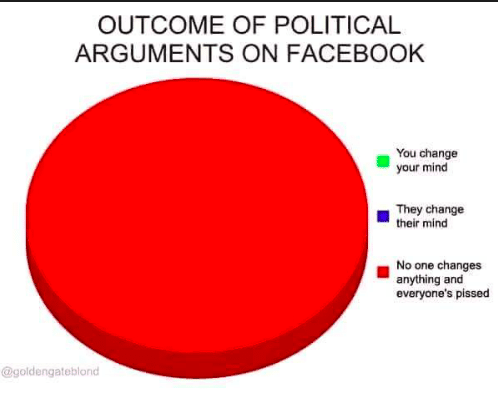
Just to be clear. I am friends with all kinds of people. All ages, races, political views, gays, trans…doesn’t matter. I like people. But what has been happening on social media is that too many people are forgetting the social norms that guide these forums.
As writers using social media, we need to remember we are creating a brand when on-line. The point of a brand is creating a name with the power to drive sales. We aren’t Regular Joe who can post whatever thought flits through his head without consequence.
We are selling to human beings who have real feelings and we are wise to consider that especially since we work a job that is 100% commission in a market that is ridiculously over saturated.
Readers are human beings. Humans are not rational creatures, especially when they are attacked. Have an opinion. Have a belief. We are writers, not Pod People. But carefully articulating an opinion is NOT what I am talking about.
It is the non-stop hateful memes, the ranting, the “If you like puppies better than kittens then just unfriend me now!” We are wordsmiths. Writers are powerful. Show me a sweeping social change, and I will show you the book that started it.
Never in the history of ever did calling someone stupid make them suddenly change their world view.
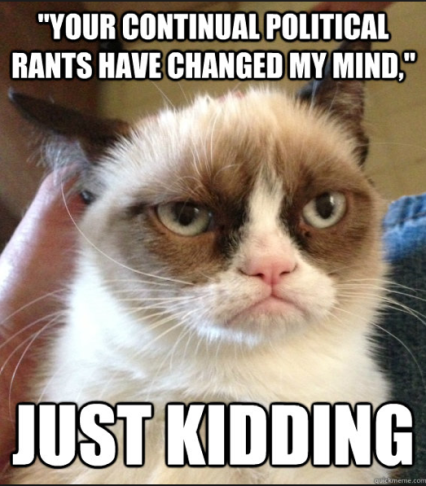
Avoid the Extremes
Any time I mention that bad behavior on-line will cost sales I immediately get attacked (ironically). Writers scream I am censoring them, that they don’t want to be whitewashed. But please calm down. This is not an all or nothing game. Just because I am calling for civility, manners and some BALANCE in no way means that I am calling for writers to hang up their beliefs.
By being on-line we are hoping to forge relationships and whether we like it or not, relationships have rules. Does it mean we never mention something we find upsetting or worrisome? No. Does it mean we don’t have thoughtful discussions or debate issues? No.
I am simply asking for folks to stop camping out in Negativity Land.
This happens in life. Do we want to hang around people who do nothing but complain? I have people I know in person who I won’t talk to because they do nothing but bitch and moan.
I hate my job. I had a bad day. My roof fell in. My dog died. My boss is mean. My coworker yelled at me. My neighbor is a jerk.
So I avoid their calls. I just don’t want to be depressed all the time.
There are a lot of writers doing this on-line. Their posts are just a nonstop barrage of complaining and being outraged. They are lacking any balance. It isn’t one post out of twenty mentions the election or birth control or rape culture or bathrooms or race issues. It is EVERY post.
Thus, I am pointing out the obvious. Yes, we have a right to camp in Negativity Land, but that comes at a cost. If every time readers check into Facebook we leave them upset or in tears? Doesn’t inspire them to buy our books.
Political Ranting WILL Cost Sales
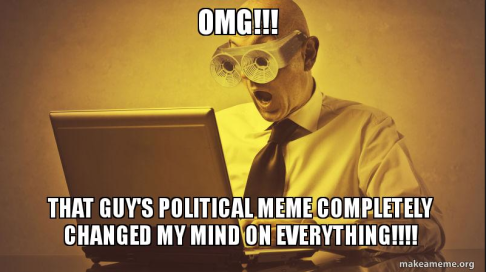
Again, let’s be clear. Having an opinion is vastly different from non-stop ranting, name-calling, berating and bullying. Yet, whenever I say political ranting is going to cost sales, I get howls of protest.
That’s not fair!
No, it isn’t. But life isn’t fair and fair is a weather condition. This is just common sense here.
If we make a habit of constantly stomping on people, guess what? While we have a right to spout off every opinion, others also reserve the right to buy from authors who don’t constantly berate them and put them on the defense.
If we acted this way in a workplace? We’d be written up and fired for creating a hostile working environment.
Do I mind a post here and there about politics? Even those I disagree with? Even inflammatory ones? Of course not. But think of Facebook (or any social site) like a cocktail party. There is a difference between mentioning a subject or discussing a belief or even having a spirited debate versus cornering someone and going for their throat.
It is called courtesy.

Please appreciate that no matter what view we hold, at least 50% of the population will disagree and they have a right to. So when we draw that line in the sand and force people to choose sides—If you don’t agree with me we can’t be friends—that just cut potential readership in half. Additionally, since most artists lean the same way? Now a LOT of authors are trying to get the same readers from half the available pie in a grossly over saturated marketplace.
My political views actually don’t impact me enjoying a good romance, zombie book, science fiction or whatever and I actually want to sell books to all kinds of people, not just clones of myself. Conversely, I buy and read books from authors who are different from me too!
Imagine that
October 12, 2016
The Dreaded Synopsis—How to Get Started & Why We Need One BEFORE Writing the Book

All righty, so last time we talked about the dreaded synopsis and covered why we need them and why they are important. Most writers wait until the book is finished to tackle the synopsis, but that isn’t an approach I would recommend. You don’t have to be a hard core plotter to gain massive benefits to writing a synopsis before ever writing page one.
I know all the pantsers groan when I mention any kind of pre-planning. You are squishing my creativity! Stifling my muse!
No. I am not. I am actually going to make you far more creative and I will prove it.
The Benefit of Boundaries
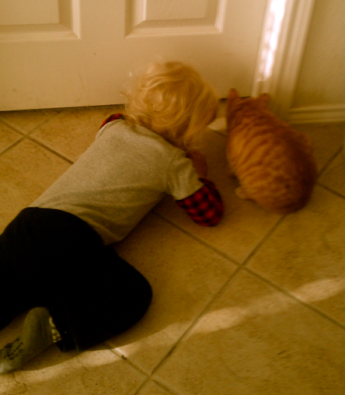
If I said to all of you. Write me a story and it is due next week, at least half of you? Your brains would vapor lock as you stared at a page.
What to write? So many ideas! How to choose?
But, if I said, I want a ten page story and it must involve a family, a circus and a stray dog, suddenly your imagination would bloom. I would get circuses in space, circuses at the turn of the century, love stories, war stories, horror stories, faith stories. Why? Because we have set some boundaries.
Want to make a toddler creative? Trap him in a playpen.
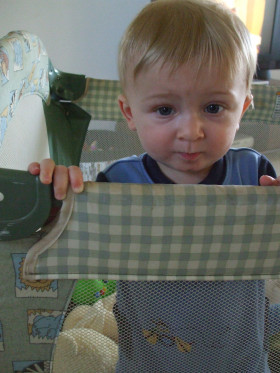
Think of your novel like a road trip. Simply picking where you want to end up helps immensely. If I refused to plan any of my trip because it would ruin my spontaneity, I could end up anywhere and no guarantee those places would be fun.
But, if I know I want to drive to L.A. (my end destination) then immediately certain highways are out of the question. If I am in Texas and want to end up in California, I-20 E is NOT an option.
Also, along the way, if I want to exit the highway to check out the World’s Largest Ball of Twine or Frank’s Best BBQ, I can, because I know that so long as I find any road leading back west, I am cool. Or, if I want to return to the main interstate at a farther point, that is easy too. I know I need some road running north-south to run me perpendicular to the interstate. So on this trip, my options are boundless because I always know where I want to end up.
Always remember. Boundaries help and…
Just because we create a synopsis doesn’t mean it is gospel.
Remember our road trip. We have innumerable options of how to get where we are going and it is okay to change things up.
Key Ingredients
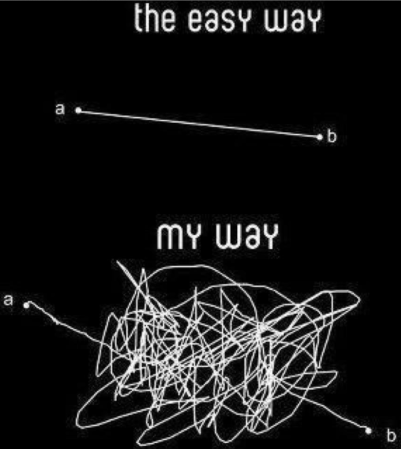
But this is where new writers run into problems. All novels involve one core singular problem and the story is only over when that problem is resolved.
Novels are not a string of bad situations. Our protagonist has one major goal and our job is to define what that is. Once we have that singular driving goal, only then we can create dramatic tension.
So when we are writing a synopsis before or after writing a novel we need to be able to articulate the protagonist’s GOAL. If we can do that much? We are way ahead of most new writers. If we do the log-line before writing the novel, we can always adjust later. Here is the formula I use.
Interesting protagonist + Active Verb—->Goal + Stakes + Ticking Clock
We must have ALL these pieces or we do NOT have a story (yes, even for the literary folks).
If I write the story first and then write the log-line and it works? Yay! It will be easier to pitch an agent and write the synopsis. If the log-line doesn’t work, however, then I can tell exactly where and why the story is falling flat (and this is why I recommend doing this before writing the book). It is far easier to fix a 50 word log-line than revise 80,000 words and retrofit an active goal.
The Trouble with Finding Dori

The recent Pixar movie Finding Dori is a good example of what I am talking about. If the screenwriters had done a log-line and come to me? I would never have approved the screenplay and made them go back to the drawing board because some crucial pieces were missing.
But no one asks me…and that is why that movie sucked.
Yeah, yeah it had cute moments Pixar is famous for and a few laughs, but it was certainly NO Finding Nemo.
I rarely go to the theater but was willing to splurge to see the sequel to one of my all-time favorite movies. But as the movie unfolded, I found my mind wandering. I was tapping my foot and fidgeting because I was hopelessly bored.

As the movie progressed, I wanted to understand why this was such a different experience, so mentally I created a log-line and it was painfully clear why Finding Nemo was a classic and Finding Dori an utterly forgettable sequel. Cute, sure. Classic? No way.
Let’s take a look. Shall we?
Finding Nemo
A control-freak agoraphobic fish father (protagonist) must partner with a fish with short-term memory issues to travel across the ocean (active verb) and rescue his son (goal) before Nemo is killed by a fish-shaking brat (stakes/ticking clock).
Versus…
Finding Dori
A fish with short-term memory issues travels to find her family.
*head desk*
See, in the original movie Finding Nemo, every part of that log-line was PERFECT. Who is the worst character to travel across the ocean? A fish terrified of open water. Oh then partner a control freak with an ally with short-term memory issues just to make him scream. And here is the kicker. He must work with her or he won’t succeed.
Additionally, the creators used the core story problem to shove the protagonist into the ONE place he WILL NOT GO but now he will because his love for his son is stronger than his terror. We also worry because Marlin is the least likely candidate to be successful on such a mission.
How will he ever do it?
There is an active goal (a rescue) and they can’t take all day. As of Darla’s birthday? Nemo is dead and flushed.
The problems with Finding Dori are numerous.
First of all she has short-term memory loss, but this is really a weak surface problem. Dori has no trouble meeting new fish and joining in and she doesn’t remember anything long enough for getting lost to present much of a problem to her personally. Unlike Marlin’s white-knuckled finned terror of the open water and the horror of potentially losing his son? Dori’s “handicap” is meh.
But the bigger problem is she just one day remembers she has a family and decides pretty randomly that she wants to find them. Okay, but if she doesn’t find them, what is the cost? Nothing really. It might be a bummer, but Dori won’t remember it in five minutes so who cares?
I certainly didn’t.
There weren’t any stakes. Her parents are not in danger. There is no ticking clock early in the movie (though they lamely tried to insert one toward the end).
The movie was literally was one bad situation then another then another. I have never wanted a movie to be over so badly.
Log-Line as a Guide-Line for the Synopsis
Log-lines are simpler and far less painful to do than jumping right into a synopsis. I prefer to do them before writing and if you are going to attempt Nano? The log-line very literally can make the difference between finishing and fizzling.
If you have a story that isn’t working? No agent wants it? You can’t figure out how to fix it? Do a log-line. It is an amazing diagnostic tool that will save you a ton of time rearranging deck chairs on the Titanic.
Too many authors are reworking those first chapters, polishing the prose, adding description when all along the problem is there is no clear story goal or the stakes are too low or the timeline is not there or too loose.
Also, when it comes to writing that synopsis, it is far easier to build a 500 word synopsis off a 50 word log-line than it is to try and condense 90,000 words into 500. And, if no matter how hard you are trying you cannot get your story into a synopsis, the log-line will point out where your story is struggling and why that is manifesting in the synopsis.
If you want to do Nano, I am offering a class on log-lines and on synopses next week, so I strongly encourage you to consider joining up.
What are your thoughts? Other than you loved Finding Dori and I am a horrible person for not liking it
October 6, 2016
The Dreaded Synopsis—What It REALLY Reveals About Our Writing

There is one word known to strike fear into the hearts of most writers. Synopsis. Most of us would rather perform brain surgery from space using a lemon zester and a squirrel than be forced to boil down our entire novel into one page.
Yes one.
But alas we need to for numerous reasons. First and foremost, if we want to land an agent, it works in our favor to already have an AWESOME synopsis handy because the odds are, at some point, the agent will request one.
Sigh. I know. Sorry.
A Quick Aside
When it comes to synopses, I lean toward the, “Better to beg forgiveness than to ask permission” camp. Which is where already having a seriously spiffy synopsis helps.
Think of it this way. E-mail sucks. Getting lots of email and having to juggle it all sucks. Agents get a lot of email. Since I am also a person who gets a ridiculous amount of email, I can tell you with conviction that I LOVE people who save me work. They do this by saving me steps.
Most queries these days are via email and since agents don’t like getting their computers crashed by a virus? This means the query will be pasted into the body of the email (no attachments).
Believe it or not, agents like writers. In fact they need writers. They don’t get paid without a writer and last I checked agents also really like being paid in money—not adorable pigmy goats and trust me you will only make THAT mistake once.
Where was I?
Agents need writers. Just as much as they are looking for reasons NOT to read our book, they are simultaneously looking for reasons TO read our book.
I know it’s a paradox much like time travel. Don’t think about it too long or your brain will cramp.
In my opinion, there is nothing wrong with ending your query with: I have taken the liberty of pasting the one page synopsis of my novel below for your convenience.
Worst case scenario? They don’t scroll down. OMG!
But best case is they DO scroll down and they like it! Better yet, you are off to an awesome start because you just saved them a crap-ton of time.
Why Do We Need a Synopsis?
If you don’t want to automatically include the synopsis that’s fine, but if you write a really good one (which IS possible if the story is strong)? Why the hell not?
All right, so what if you aren’t brave enough to include a synopsis and are just praying that the subject never comes up and the agent just asks for a full. Okay, great! Problem is, if you do get a book deal, often the editor will want you to write a synopsis of the book you are writing next (for approval of course).
Ugh, so if you go traditional, really no dodging it.
Some of you might be saying, Oh, but Kristen! Traditional is sooo yesterday and I am self-publishing. I don’t need a synopsis.
Technically correct, but actually I do recommend a synopsis for all the reasons writers loathe writing them.
Why All the Angst?
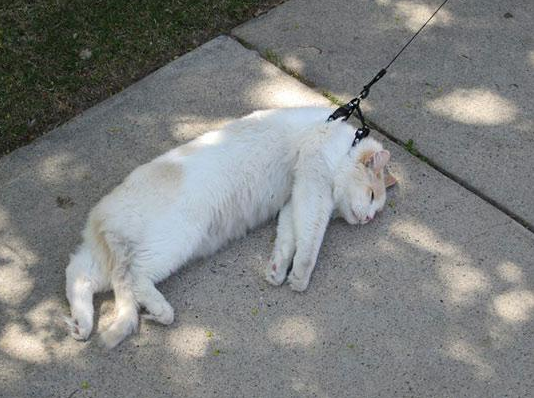
Dramatization of writers off to work on a synopsis.
So a big reason that writers hate writing synopses with the power of a thousand suns is that we believe every word we have written is precious and every character vital and necessary. We lack perspective, especially if we haven’t had any time or distance away from the work. This is normal.
But a bigger reason that many writers hate writing the synopsis (particularly for first-time novels) is it makes it painfully obvious we have no story or a terribly flawed story.
The synopsis strips away our pretty prose and all our verbal glitter and it lays our story bare.
Today I want to talk about the BIG PICTURE stuff. What is it our synopsis is really out to reveal? If we don’t first grasp that, no amount of tips I give for writing a great synopsis will help.
Synopsis as Skeleton
The synopsis is the skeleton of our story. What do skeletons do? They support everything else. The skeleton is the guidepost for all that is to come. We can see the skeleton of a fish and “see” the fish even without benefit of gills and scales. We can see an elephant skeleton and get an idea of scope and size and finished “entity/product.”
But most importantly, we don’t have to be a doctor to look at a skeleton and tell that something is horribly wrong.

Image via Wikimedia Commons.
We don’t need a lot of imagination to see how this skeleton above is going to flesh out, pardon the pun. We can see just at a quick glance that this human skeleton is going to have a lot of problems because of the various deformities.
The same holds true with a story skeleton. If the narrative orbital sockets are located in the posterior, we don’t care how pretty the eyes are if they are in the @$$.
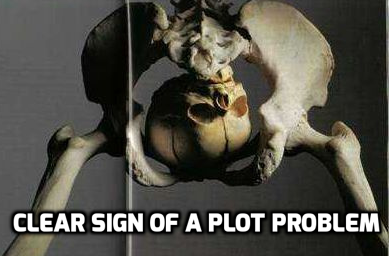
There is no amount of witty dialogue or clever prose that is going to rescue a plot that is missing vital parts or has them in the wrong place.
Yes, we are sending a synopsis in hopes of selling a story, but how is the synopsis doing this? Plain and simple? The synopsis is letting the agent see if the skeleton is solid, symmetrical and is of a creature that is rare, cool and maybe never seen before.

Image via Flikr Creative Commons, courtesy of Steve Starer.
An agent is also looking at a synopsis because she knows it is the fastest way to reveal terminal (deal-breaker) errors.
***For the self-published folks. Technically you don’t need to write a synopsis, but if you can’t for any of these reasons below, the novel might not yet be good to go and this could save a bunch of nasty reviews.
Is the premise weak?
I get pages all the time from “finished novels” but there actually is no story. Just because we have 80,000-100,000 words does not mean we have a story.
Is it really a novel or just melodrama?
Do we have a solid plot or just “scene” after “scene” of bad situations?
Does the “plot” rely on trickery? Gimmick?
Often writers are having a panic attack about writing the synopsis because the entire book rests on a “clever” twist ending that often really isn’t a twist but rather a gimmick.
I.e. It was all really a bad dream.
No.
Does it require deus ex machina to resolve?
I call this a Luck Dragon. So protagonist is enduring plight after plight and all seems lost when she finds…………a journal!
No.
Does it really resolve?
New writers often don’t understand structure, which naturally means they don’t yet understand that series follow similar structure guidelines to a singular novel. And btw, it is OKAY to be new, so breathe!
Even series still follow three act structure. But say the story follows four or even five act structure. doesn’t matter. The story is not over until the core story problem introduced in the beginning is resolved.
Series work the same way. If it is a connected series, then it works a bit like those Russian nesting dolls. Every book has a bigger and bigger problem to solve until finally the CORE problem is solved/antagonist is defeated.
In LOTR: Uruk-Hai defeated—> Saruman defeated—>Sauron defeated
Which means NO BATMAN ENDINGS.
Stay tuned for next week book!
Often I get, Oh well the reader will have to read the next book to know if she lives. Nope, not how that works unless we write for Days of Our Lives.
No matter the structure we use, our story must come equipped with a satisfying resolution or that skeleton is missing arms. In the case of a connected series, often a gatekeeper to the Big Boss is defeated but the journey continues toward that final showdown. No being clever by withholding a resolution.
There is only one The Lady or the Tiger? and the only reason that story is read at all is because it’s one of the only ways English teachers can get back at us for having to read our crappy essays.
Is the writer breaking genre constrictions in unforgivable ways?
For instance, romance comes with an HEA (happily ever after). No HEA? It ain’t romance and if the author is selling it as romance in the query, but the story ends in a breakup? The agent knows this is a new writer who doesn’t understand that genres have expectations.
Is the story just not all that remarkable?
Once the plot is laid bare, is it truly anything unique? A fresh twist on an old idea? Or is it really just more of the same?
My book is about a thirty-eight-year-old female executive who decides she wants to have a baby and the struggle of being an older mom.
Okay *falls asleep*.
My book is about a thirty-eight-year-old female executive who finds out she’s pregnant with her first child at the same time her teenage stepdaughter reveals she, too is expecting.
*perks up* Hmmm, interesting.
The Good News
When we can write a concise and interesting synopsis, it shows our level of skill and the strength of our story. If we can write tight and clean here, it bodes well for the book. If your brain is in knots writing your synopsis, relax.
If the story is there the synopsis is too. It’s just a matter of unearthing it.
Though we will talk more on how to do this later, I do recommend starting with forming a log-line. If you can boil your entire book into one sentence? The synopsis can be built using that and it is far easier to build UP TO one page than whittle DOWN 300 into one.
Here is an earlier post about how to do the log-line. Additionally, if you need more help, I have a class coming up on how to do your log-line and the added benefit is I do your log-line WITH you so you walk away from class with that in hand
September 30, 2016
The Girl on The Train & Two Critical Elements of ALL Great Stories

There are two essential components all great writers possess and unfortunately these are highly unnatural abilities. Most of us have to hone and refine and strengthen these skills because they are so counter to human nature. First, most humans run from conflict. Great writers go straight for it. Secondly, most humans really don’t pay attention to or explore the motivations of others. Great writers master what makes other people tick.
Conflict
We humans are hardwired to avoid conflict and that makes sense. Wandering around in the brush gathering berries, fruits and small game left one exposed and vulnerable. For our ancient ancestors? Every day the goal of “not dying” was preeminent among the Things To Do. But the problem is this. Just because we now have high-rises, smart cars and Facebook, it doesn’t mean that our biology has caught up.
It’s why modern humans are struggling with so many neuroses and stress illnesses. We are wearing out our fight or flight mechanisms because the body cannot tell the difference between outrunning an angry bear or taking on a Facebook troll.
Rejection very literally meant death for thousands of years. We had to have the safety of a tribe to keep us fed and safe. Isolation was a death sentence.
So fast-forward to modern times and there is always this every-present voice to keep the peace. To not make waves. Problem is? Fiction is the wave-making business.
Understanding Other Humans

Image via Flickr Creative Commons, courtesy of DualD Flip Flop
Most people operate from a perspective that is highly self-centered. I am not meaning this to be disparaging, but we do. If someone won’t talk to us or avoids us, we often assume that person is mad at us. This goes back to that fear of rejection thing. Another human avoiding us is less often about them and more about us.
What did I do? Did I say something wrong? Why doesn’t she like me?
It is a rare person who automatically thinks, “Wow, I bet that person is very shy.”
Whenever we encounter those who are naturally gifted authors, I believe it has less to do with the ability to write, to string words and lovely prose together. It is more that those folks naturally dive headfirst into conflict without hesitation. They also are acutely aware of the goals, conflicts and motivations of others.
The rest of us? We simply have to train these.
How Conflict is Birthed from Understanding Weakness
I do a lot of editing and very often it’s the work of new writers. As I read pages I often can see this is a person who likely made As in English (only college was not training us to write commercial fiction).
On the surface there is nothing wrong…except that everything is surface. Too often new writers are far too nice. They hesitate to exact authentic suffering and instead settle for a shill…the bad situation.
Bad situations don’t say anything about who we are. It highlights nothing about our failings as people, about our flaws. Anyone can be attacked by a band of blood-thirsty marauders, get caught in a hurricane, singed by a dragon or attacked in an alley. This is all external and says absolutely nothing about people, about who these characters are. Because it’s surface. The bad situation alone is not enough.
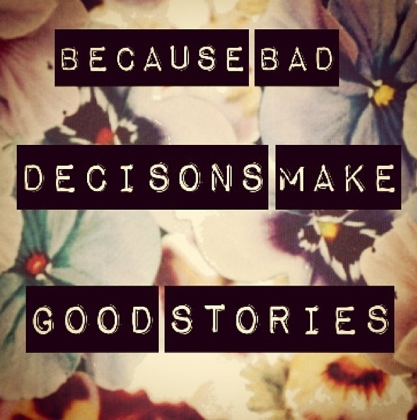
I love this meme because this literally says it all. When we are new, however, we are very uncomfortable with bad decisions. Truly bad decisions. Often our first novels are more of a holodeck for us to play out how our world should have turned out, starring the person we always wanted to be. Dialogue often sounds like eavesdropping on a child playing alone.
I call this Literary Barbie Syndrome (or Literary G.I. Joe Syndrome for the guys
September 28, 2016
3 Ways to Reignite Your Writing Career TODAY!

Image via Flickr Creative Commons, courtesy of Sally Jean
Man, I have missed you guys! Spawn flattened me with a stomach bug #kidsarecutebutevil. But, I am back so let’s get to work. All of us have days where we wonder if what we do even matters. Why did we have to become writers? Especially in these times?
Why couldn’t we have gotten into this gig when wealthy patrons financed our work? And we could seal our manuscript with a fancy wax seal like the kind we bought for ourselves at Barnes & Noble but are too shy to use on our water bill?
I know y’all bought one too, and for those who didn’t, is that a quill and ink set from the Renaissance festival I detect? Do I smell parchment?[image error]
Ah the good old days…
I am an “Old Dog” of the digital publishing paradigm. I’ve been through all the fads. The FREE BOOK Rush of 2010, The Great .99 Book Deal of 2011, The Amazing Algorithmic Alchemy, The Magical Metrics and the Automation Invasion of 2012-2015 (there are still skirmishes along the front). Now I am enduring The Newsletter is Gold Rush.
Guess what? I’m still here.
I don’t say this really to brag as much as to make a point. Social media, done properly is not a short-term burst of gimmicky energy. There is no magic to it and it while it is simple, that doesn’t mean it’s easy. We not only have to manage the brand, we also produce the product.
Not a job for the faint of heart.
And with all the tweeting and blogging and slogging month after month and year after year, I know that it is SUPER easy for us writers to get overwhelmed. That’s why today, I’m here to offer some simple ways to inject fire back into your writing and your career.
*plays Eye of the Tiger loudly* *punches at the air*
#1—Appreciate that Writing & Social Media Branding Can Coexist
When I am on Twitter, I often get tweets like these:
Guess what? I agree! The writing always, always comes first.
But why is there an almost automatic assumption we must choose?
Social media, done the way I teach in Rise of the Machines, takes maybe 10-15 minutes a day and feel free to take off weekends. I offer no get-rich-quick advice. My author platforms take time (and discipline) to build, but they are virtually indestructible. It isn’t about quantity, it is all quality and then being consistent.
If we assume that platform-building is this awful horrible time-intensive thing? Then we psych ourselves out of some truly fantastic benefits. Additionally, our own misconception how much time social media takes can be smothering our creative fires.
But that is a lie. Solid branding/platform-building isn’t about large chunks of time, rather it is small consistent effective action. I can assure you, it is very possible to write books and be on social media.
Just like we can bathe and brush our teeth. No need to choose
September 22, 2016
Why I Hate “The Giving Tree”–But How This Story Makes Us Better Writers

I’m going to say something possibly unpopular and perhaps a bit strange. I hate the children’s book The Giving Tree, even though oddly, it was my favorite book. I remember being five and reading the story and just weeping for the tree, feeling devastated. Understanding what she was feeling. I recall hating the boy and the self-centered narcissist he grew up to be. Taking and taking and never giving.
Why did the narcissist cross the road? Easy. She thought it was a boundary.
As a child I was obsessed with most of Shel Silverstein’s work, memorizing poems from Where the Sidewalk Ends. But maybe my early fascination with Silverstein highlights what good writers do for their audience, no matter the age.
While many people love The Giving Tree and hail it as a wonderful tale of unconditional love, there is also the other camp who finds the tale remarkably disturbing. But look at what this simple story says about its audience.
Point of View
First of all, I wonder if the story is much like those images we see in self-help books. One person sees an old hag and the other a beautiful young woman staring in the mirror. Does the child who comes from a kind and loving family see the maternal tree as a caretaker who loves no matter what? No strings attached? Or is the child seeing a reflection of the dance of codependency and narcissism around them?
Children are very smart. They see with much more honest eyes than most adults.
Reflection of Self

Image via Flickr Creative Commons, courtesy of DualD Flip Flop
I’ve talked about this before in my post, Drop the Donkey. I honestly believe that stories we gravitate to as children says a lot about our fundamental nature, our strengths and weaknesses.
I always loved the parable of the Tortoise and the Hare, namely because one of my strongest traits is my persistence. I loved the parable of The Crow and the Pitcher because I was always good at finding clever ways to solve seemingly impossible problems. The stories I loved possibly reflected back personality qualities that even at a very young age, I possessed and was even proud of.
But then there was my dark side, a side I noticed even by the tender age of four when I was sounding out the words And the tree was happy. My tendency to people please (Old Man Whickutt’s Donkey) and my seeming inability to set a boundary with those who would take and take until I had nothing left to give (The Giving Tree) and me happily enabling my own self-destruction. The anger I felt toward the tree being a fledgling anger I felt for myself.
Why did the boy feel the need to take all the apples? All her branches? Why couldn’t he just take some? Why did the tree feel the need to offer all her apples and all her branches? Couldn’t he see he was killing her? Did he even care?
When it came to her trunk? Why didn’t she tell him to just go pound sand?
God, how many times have I done the same?
Less is More
As writers we are often guilty of too much brain-holding, of coaching the reader. We want to control every emotion, perception and description yet often less is more. When we leave blank space for the reader to fill in, the fiction can have room to blossom into something unplanned for. The story becomes richer and the experience more visceral because it transforms into an echo of the audience’s self-projection. Thus instead of one fixed interpretation, we get countless.
We end up with a story that is told and retold for generations simply because we all disagree about what it’s even about.
Shel Silverstein didn’t write The Giving Tree with plans that it was a cautionary tale against toxic relationships. He didn’t write it to be some Christ-like example of selfless love. He wasn’t writing a tale of capitalism run amok or misogyny. According to him, he simply wrote a story about the complicated dynamics of human relationships. We, as the reader, assign whether this is a tale of warning or wonder, horror or hope.
Good Stories Make Us Look at Ourselves

Image via Flikr Creative Commons, courtesy of Geriant Rowland
One of the reasons humans gravitate to stories is we learn through them. There is even scientific evidence to support that learning becomes far more embedded in memory when it is delivered in the form of story. We are wired for narrative. This said, we all struggle in certain areas and stories are a great way that we can experience cause and effect, trial and failure through others. We have a safe place to learn the hard lessons.
Often if I encounter something that upsets me or makes me angry I know it is because it is something that is bothering me about myself. Instead of avoiding the feeling or dismissing it, I have learned instead to explore it and ask why.
I think this is why good fiction is so vital. Yes there is a place for the fantasy character we all long to be. The market is filled with beautiful tough heroines who know Kung Fu and bake cupcakes the Navy SEAL men who love them.
But then there are the other kinds of stories.
Great fiction will not just tell our story (the one we plotted), but it will tell the story of our readers, too.
Empathy, Injustice and Grief

Spawn when he realized Daddy was ordered to deploy to Afghanistan.
Our culture is guilty (my POV) of assuming that every child’s story is to serve as a role model. Don’t bully. Be a good friend. This is what happens when you learn to share. But literature serves a higher purpose.
Isn’t the point of being a parent to rear a fully developed person more than simply being an activities director? That we are charged with rearing a grownup with fully developed empathy and a sense of injustice? Doesn’t it say something when a child reads a story like this and is incensed at the injustice of it all?
The children’s movie Inside Out explored how dysfunctional we have become regarding human emotion. We aren’t permitted to be angry, sad, disappointed, jaded or hurt. We can be depressed (because there is a pill for that). Yet these “negative” emotions serve a purpose. It is okay to be angry and sometimes it is downright warranted. It is all right to be afraid.
Our culture has become obsessed with never being offended and yet being offended is vital. There are things that should offend us. That is when real change is possible.
Insulating entire generations from ever experiencing negative emotions is in a word? Psychotic.
Silverstein didn’t believe in happy endings being a necessity. He felt that set children up for failure, that things didn’t always work out. That if every book had an HEA then children would wonder what was so wrong with them. They didn’t always get an HEA in their lives. What were they doing wrong?
Nothing, my Wee One. It is life. Fair is a weather condition.
Good stories also serve as catharsis. We need to watch comedy because we do need to laugh, but you know what? Sometimes what we need is a good cry, too. And maybe we aren’t yet “evolved” enough to cry over what is going wrong in our own lives, but we can cry for a beautiful tree that was rendered a stump.
And that makes us all just a little bit more human.
What are your thoughts? Did you love or hate The Giving Tree? Do you find yourself reflected in that story? Have you, too, struggled with not allowing people to take every single apple and branch? What other works of fiction left blank spaces you were allowed to fill? Or allowed you to be angry or maybe even cry?
I LOVE hearing from you!
To prove it and show my love, for the month of SEPTEMBER, everyone who leaves a comment I will put your name in a hat. If you comment and link back to my blog on your blog, you get your name in the hat twice. What do you win? The unvarnished truth from yours truly. I will pick a winner once a month and it will be a critique of the first 20 pages of your novel, or your query letter, or your synopsis (5 pages or less).
Check out the other NEW classes below! Including How to Write the Dreaded Synopsis/Query Letter TOMORROW! I have also included new times to accommodate the UK and Australia/NZ folks!
All W.A.N.A. classes are on-line and all you need is an internet connection. Recordings are included in the class price.
Upcoming Classes
NEW CLASS!
TOMORROW! Pitch Perfect—How to Write a Query Letter & Synopsis that SELLS
You’ve written a novel and now are faced with the two most terrifying challenges all writers face. The query and the synopsis.
Query letters can be daunting. How do you sell yourself? Your work? How can you stand apart without including glitter in your letter?
***NOTE: DO NOT PUT GLITTER IN YOUR QUERY.
Good question. We will cover that and more!
But sometimes the query is not enough.
Most writers would rather cut their wrists with a spork than be forced to write the dreaded…synopsis. Yet, this is a valuable skills all writers should learn.
WEDNESDAY October 5th Your Story in a Sentence–Crafting Your Log-Line
Log-lines are crucial for understanding the most important detail, “WHAT is the story ABOUT?” If we can’t answer this question in a single sentence? Brain surgery with a spork will be easier than writing a synopsis. Pitching? Querying? A nightmare. Revisions will also take far longer and can be grossly ineffective.
As authors, we tend to think that EVERY detail is important or others won’t “get” our story. Not the case.
If we aren’t pitching an agent, the log-line is incredibly beneficial for staying on track with a novel or even diagnosing serious flaws within the story before we’ve written an 80,000 word disaster. Perhaps the protagonist has no goal or a weak goal. Maybe the antagonist needs to be stronger or the story problem clearer.
In this one-hour workshop, I will walk you through how to encapsulate even the most epic of tales into that dreadful “elevator pitch.” We will cover the components of a strong log-line and learn red flags telling us when we need to dig deeper. The last hour of class we will workshop log-lines.
The first ten signups will be used as examples that we will workshop in the second hour of class. So get your log-line fixed for FREE by signing up ASAP.
Those who miss being in the first ten will get a deeply discounted workshop rate if they would like their log-line showroom ready.
SATURDAY, October 8th Blogging for Authors
Blogging is one of the most powerful forms of social media. Twitter could flitter and Facebook could fold but the blog will remain so long as we have an Internet. The blog has been going strong since the 90s and it’s one of the best ways to establish a brand and then harness the power of that brand to drive book sales.
The best part is, done properly, a blog plays to a writer’s strengths. Writers write.
The problem is too many writers don’t approach a blog properly and make all kinds of mistakes that eventually lead to blog abandonment. Many authors fail to understand that bloggers and author bloggers are two completely different creatures.
This class is going to cover:
How author blogs work. What’s the difference in a regular blog and an author blog?
What are the biggest mistakes/wastes of time?
How can you effectively harness the power of algorithms (no computer science degree required)
What do you blog about? What topics will engage readers and help create a following?
How can you harness your author voice using a blog?
How can a blog can help you write leaner, meaner, faster and cleaner?
How do you keep energized years into your blogging journey?
How can a blog help you sell more books?
How can you cultivate a fan base of people who love your genre.
Blogging doesn’t have to be hard. This class will help you simplify your blog and make it one of the most enjoyable aspects of your writing career.
For those who need help building a platform and keeping it SIMPLE, pick up a copy of my latest social media/branding book Rise of the Machines—Human Authors in a Digital World on AMAZON, iBooks, or Nook.


September 16, 2016
Adding Depth to Your Fiction—Body Language 101

Image by Gopal 1035
Today regular guest writer Alex Limberg is back with a post that will make any of your dialogue scenes sound so much smoother. His piece is about body language. Raise your eyebrows and drop your chin in delight, because Alex is about to help you get under your readers’ skin with your dialogue. Also, you should definitely check out his free checklist about “44 Key Questions” to make your story awesome. Now clap your hands: 3… 2… 1… here we go:
***
“Crossing my bridge on your flying rhinoceros? You better reconsider that,” the troll said and raised his fist.
When you are reading the sentence above, you know immediately what the situation is about: The troll is threatening the other person (and a flying rhino is coming your way). And the reason you know exactly what’s up is, you guessed it, the fitting description of body language. Body language is added in just four tiny words. But those four words add a lot of depth to the scene.
The physical snippet makes your reader visualize the scene; it puts the graphic image of a big, green, threatening troll fist in his head.
It also brings some nice variation to your dialogue; it’s more interesting than a plain, boring dialogue tag (“the troll said” or “the troll shouted.”)
It introduces character and overboiling emotion – you know it’s better not to tangle with the green guy.
And finally, it adds some physicality to your story, as opposed to just “blah, blah, blah” dialogue and scenic description. It makes for well-balanced speech.

Image by Gil
All of this is the power of using body language.
Here is a short Body Language 101 that will help you with “puppeteering” your characters’ bodies:
1. Use Body Language Only From Time to Time
If you use body language too much, it will become annoying and obvious and lose its subtle qualities. Instead, only describe characters’ facial expressions and postures from time to time. Make them smoothly blend in with the dialogue and the other scenic description.
Sneak your body expressions into the mix unobtrusively. Remember that you have several other options to “tag” and break up your dialogue lines:
You could use a dialogue tag (“Let’s go to the party then!” Sandra squealed.)
You could describe what the characters are doing (“Let’s go to the party then.” Sandra held the invitation out to him.)
You could describe what else is happening in the scene (“Let’s go to the party then!” Suddenly the doorbell rang.)
You could just leave the dialogue line standing alone (“Let’s go to the party then.”)
You could describe a facial expression, posture or movement of the character who is speaking and put it directly before or after his dialogue line, to let the reader connect the dots himself (“Let’s go to the party then.” Sandra’s face lit up.)
Try to vary these options, so none of them gains the upper hand and becomes annoying. That way you will get a well-balanced and structured scene that pays equal attention to dialogue, characters and descriptions.
When you insert body language, always do it in passing and don’t give any extra weight to what you describe.
2. No Explanation, Just Body Language
If you want to look really stupid, you could write like this:
“So surely you can tell me where you were on the evening of the twenty-second of October?” George asked with eyes narrowed to slits, because he felt very suspicious about Blake’s story.
This example does both, showing and telling. That’s one too many, and the too many one is the telling part! Cut out “because he felt very suspicious about Blake’s story.”
When you write like this, you also take your reader for stupid. Let her connect the dots herself – if she has followed the story, she will know why Georg’s eyes are pressed to slits.
Try it like this:
“So surely you can tell me where you were on the evening of the twenty-second of October?” George asked, his eyes narrowed to slits.
That’s much better, now we don’t even have to go inside George’s head artificially, we can just describe objectively what the reader sees.
Whenever possible, don’t name the feeling, but just show the body language. And definitely never put both of them (body language and description of feeling) together in the same sentence.
Showing, not telling is sometimes not easy to do when you are caught up in the writing process. That’s why I created my free checklist about “44 Test Questions” to make your story great. It’s a comprehensive, no-holds-barred list about what I learned makes a good story, and you can download it right away.

3. Have a Very Clear Idea of What Your Character Is Feeling
Take a look at this ambitious description of body language:
“Randy held one hand in his other behind his back, then suddenly stroked his throat while he was leaning towards Linda.”
What’s happening here? Nobody knows, Randy’s behavior is too much. As far as we are aware, it doesn’t make any sense. It seems like the writer pays attention to the undertones so much, that in the end he is not really saying anything.
Don’t write so cryptically that nobody can understand where your character is coming from. A simple description of one piece of body language at a time is absolutely enough. You, the author, always have to be clear about what your characters are feeling. And their body language has to match those feelings.
4. Follow Your Intuition When Describing Body Language
But where can you take an accurate description for flattery or envy from?
Your best bet is to take it from yourself. Imagine you feel flattered by an enormous compliment, like the best compliment ever. What expressions would your face, your arms, your body be making? Totally immerse yourself in the feeling like a good actor, and see which body expression fits.
Remember the last time you felt really envious about somebody? Use that memory to immerse yourself in the feeling for a second and ask yourself how your body would react.
Reading a book about body language is also an excellent idea. The Definitive Book of Body Language by Allan and Barbara Pease is a very systematic and comprehensive guide to everything you ever wanted to know about body language. I recommend it whole-heartedly.

5. Several Types of Body Language You Can Use
Our bodies have several ways of giving our secrets away. Here are some examples and a bit of inspiration on what’s possible:
Facial expressions: The human face is an endless source of expressions. Think of raised eyebrows, tightly pressed lips, blown up cheeks, wrinkled noses, wide eyes, frowned brows, poked out tongues, widened nostrils… most feelings show through several features
Body postures: Crossed arms, legs wide apart, foot put forward, leaned back upper body, spread elbows, locked ankles, body pointing away, tilted head… all of these have something very distinctive to say
Body movements: Adjusting tie, nibbling on temple of glasses, whipping foot, raising hand with palm toward opposite, flicking the hair, putting hands in pockets, grabbing the other’s upper arm, scratching one’s nose… do you know what all of these mean?
Equipped with all of this knowledge, you now have an extremely elegant and effective way to describe what’s really happening under the surface of your scene. You can now go fill your characters with overflowing emotions and life.
Once you manage to describe how their feelings subconsciously pour out of them, your figures will automatically take on a life of their own and feel like they were standing next to you in your living room. And your reader won’t be able to keep from loving or loathing them whole-heartedly.

Alex Limberg is blogging on ‘Ride the Pen’ to help you boost your fiction writing. His blog dissects famous authors (works, not bodies). Polish your dialogue, plot, characters and much more to greatness with his free checklist about “44 Key Questions” to test your story . Shakespeare is jealous. Alex has worked as a copywriter and in the movie industry. He has lived in Vienna, Los Angeles, Madrid and Hamburg.
Thumbs up, Alex!
It’s Kristen again, and I’m back to ask you: Are you guilty of completely neglecting body language in your stories? Do you have a favorite body part or movement to describe? Aren’t knees so much cooler than elbows? Do you ever forget to jump up and down when you are happy?
Remember that comments for guests get double love from me for my contest!
I love hearing from you!
To prove it and show my love, for the month of SEPTEMBER, everyone who leaves a comment I will put your name in a hat. If you comment and link back to my blog on your blog, you get your name in the hat twice. What do you win? The unvarnished truth from yours truly. I will pick a winner once a month and it will be a critique of the first 20 pages of your novel, or your query letter, or your synopsis (5 pages or less).
Check out the other NEW classes below! Including How to Write the Dreaded Synopsis/Query Letter!
All W.A.N.A. classes are on-line and all you need is an internet connection. Recordings are included in the class price.
Upcoming Classes
NEW CLASS!
Pitch Perfect—How to Write a Query Letter & Synopsis that SELLS
You’ve written a novel and now are faced with the two most terrifying challenges all writers face. The query and the synopsis.
Query letters can be daunting. How do you sell yourself? Your work? How can you stand apart without including glitter in your letter?
***NOTE: DO NOT PUT GLITTER IN YOUR QUERY.
Good question. We will cover that and more!
But sometimes the query is not enough.
Most writers would rather cut their wrists with a spork than be forced to write the dreaded…synopsis. Yet, this is a valuable skills all writers should learn.
Sign up early for $10 OFF!!!
Blogging for Authors
September 17th
Blogging is one of the most powerful forms of social media. Twitter could flitter and Facebook could fold but the blog will remain so long as we have an Internet. The blog has been going strong since the 90s and it’s one of the best ways to establish a brand and then harness the power of that brand to drive book sales.
The best part is, done properly, a blog plays to a writer’s strengths. Writers write.
The problem is too many writers don’t approach a blog properly and make all kinds of mistakes that eventually lead to blog abandonment. Many authors fail to understand that bloggers and author bloggers are two completely different creatures.
For those who need help building a platform and keeping it SIMPLE, pick up a copy of my latest social media/branding book Rise of the Machines—Human Authors in a Digital World on AMAZON, iBooks, or Nook.


September 14, 2016
Does FB Sell Books & Do Writers Need a Facebook Fan Page?

Social media is powerful for connecting us (our books) with the very people we wrote them for to begin with. But, we are wise to appreciate that creating a brand and cultivating genuine and passionate fans is not going to happen overnight. The deeper the roots, the stronger the brand and the platform.
Why that is important is if we keep chasing the newest shiny, we fail to ever gain compounding results. We are chasing fad after fad. Thus a saner approach is to build places that are the most stable.
***Yes, we can build on Instagram and SnapChat and the like, but that will come with more risk and possibly devour time we need to write more books.
The blog is still the strongest and most resilient form of social media. Blogs have been around since the 90s and unless the Internet goes down? Blogs will remain.
But other than a blog (at least for the moment) Facebook is the next strongest and most resilient. I recommend Facebook because I come from sales and in sales we had a saying: Fish where the fish are.
The readers fish are schooling on Facebook.
But here is where I often get a disconnect with writers. The first thing I often hear is Facebook doesn’t sell books!
And this statement is both correct and incorrect.
ALL social media is horrible for direct sales. Why?
It isn’t the place for it.
Trying to conduct direct sales on social media is akin to me showing up to a friend’s BBQ and toting in a portable table, boxes of books and a cash box then setting up shop next to the potato salad.
It’s rude. I would be invading that social space with a selfish agenda.
However, this doesn’t mean that going to the BBQ is completely useless for book sales. As I talk and chat with people and they find out I am a writer, they get to know me (hopefully like me) and this sparks curiosity and interest that could likely turn into a sale.
Additionally, if the person likes my book, there is a far deeper loyalty because I am the author they are “friends” with.
Facebook Doesn’t Does Work
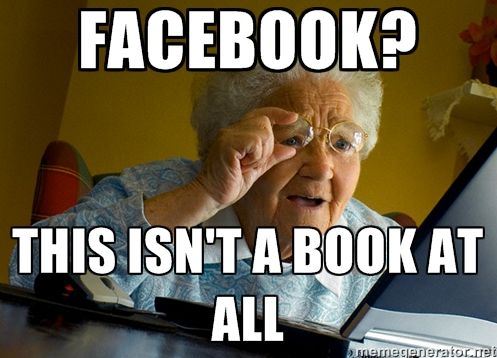
Facebook, like a hairdryer, a screw driver or a jack hammer is a tool. Just because we are not getting the results we want doesn’t mean there is something wrong with the tool. We have to know how it works and how to use it for the results we desire.
We first need to understand the purpose of the fan page and this is where it can get sticky.
I do not recommend brand new authors with nothing yet for sale to have a fan page. First you don’t need one since you are not yet conducting any business. Secondly, it’s a formula to want to overdose on tequila and cookie dough when the only “fans” you have after three months are your mother and ten friends from your kids’ Aqua Tot class.
Building a fan page this way is excruciatingly difficult. This is why I recommend building your personal page first.
Your personal page is the foundation that will later support the fan page.
It can help you get to know people, and they get to know you and that you are a writer. Once you hit a couple thousand “friends” you can then build your fan page OFF your personal page.
This holds many advantages.
First, it makes navigation simple. You can simply switch back and forth across the two pages. Here is the view from the top of my personal page. I can switch easily and see if I have messages, etc.

Also, because folks have spent months getting to know us on the personal page, it is far easier to post a message:
Hey, finally getting an author page. Would you mind giving it a “like”?
The personal page has a lot more ability to socialize with others and this is the place you do the bulk of your initial networking.
Of course, you might now be asking, “Then why do we need a fan page at all?” Good question.
Why DO We Need a Fan Page?
YES. And the reason is that Facebook is very strict about keeping business and socialization separate. Now, this doesn’t mean we are the “all-selling-books-all-the-time-channel” on the fan page, then we only act like a human being on the personal page.
It only means that we cannot conduct commerce on a personal page without risking Facebook deleting our profile for violating the Terms of Service.
We CAN, however, post about books or classes for sale and promote them on a fan page. That is the purpose of the fan page.
Additionally, as your platform and fan following grows, eventually you will need a page that can accommodate over 5,000 people. A great problem to have, btw
September 12, 2016
Why the Fashion Industry is Dying—Laughing at Salad & Cleavage Snacks
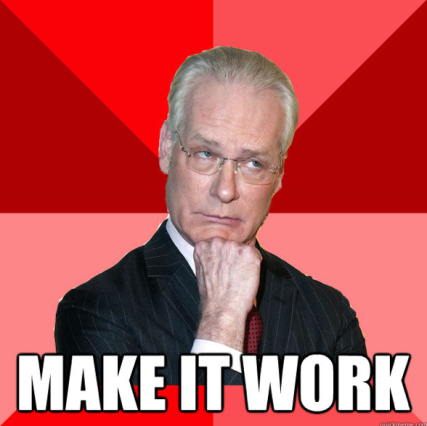
Today we are going to talk about something a bit different, but maybe this might inspire your fiction, because if the world changes guarantee you a writer was behind it
September 7, 2016
Author Brands & Book Sales—Why Boutique is BIG

Normally my blogs are all about telling y’all you are not a special unique snowflake. But yeah y’all are but don’t get a big head about it




